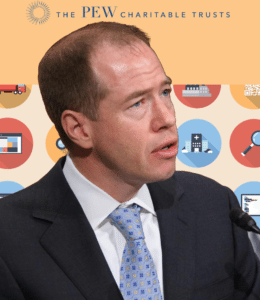Pew Trust Warns Senator Sanders that Drug Import Bill Could Compromise the Safety of the U.S. Drug Supply
 On Tuesday, February 28, Allan Coukell, Senior Director of Health Programs for the Pew Charitable Trusts, wrote Senator Bernie Sanders to ask that he not undermine safety protections for medication with the Affordable and Safe Prescription Drug Importation Act. The bill, introduced by Sanders, Cory Booker, Bob Casey, and others last month, would legalize the importation of non-FDA approved prescription drugs from Canada and, eventually, other countries.
On Tuesday, February 28, Allan Coukell, Senior Director of Health Programs for the Pew Charitable Trusts, wrote Senator Bernie Sanders to ask that he not undermine safety protections for medication with the Affordable and Safe Prescription Drug Importation Act. The bill, introduced by Sanders, Cory Booker, Bob Casey, and others last month, would legalize the importation of non-FDA approved prescription drugs from Canada and, eventually, other countries.
Mr. Coukell’s organization, the Pew Charitable Trusts, was founded in 1948 as “an independent, nonpartisan research and policy organization with a health portfolio that includes initiatives on enhancing the security of drug manufacturing and supply chain and on addressing the rising costs of prescription medication.”
Mr. Coukell cautions Senator Sanders that while considering potential savings generated by the enactment of his drug importation bill, Congress must consider its impact on the Drug Quality and Security Act (DQSA) of 2013, a bipartisan bill passed to safeguard medication quality and authenticity:
This law protects public health by establishing a national drug supply chain security system that requires every package of drug product sold in the U.S. to carry a product identifier that will enable electronic tracing of that product throughout the drug supply. By 2023, all manufacturers, repackagers, wholesalers and pharmacies must participate in this system, creating an interoperable electronic drug security system that can track every unit of drug product, everywhere in the supply chain.
A fully enforced DQSA will ultimately make counterfeit drug detection easier and streamline and speed up any needed product recalls.
The Affordable and Safe Prescription Drug Importation Act leaves “significant gaps” in the security of the drug supply chain because it overlooks the fact that FDA regulations cannot be enforced on unlicensed, foreign manufacturers and underestimates how lucrative the counterfeit drug market is for the criminals who make and sell fake medication. Mr. Coukell points out that “product(s) would be sold into the U.S. system without the product identifiers necessary to allow a fully electronic and interoperable drug security system, thus making it difficult for supply chain partners who encounter product that is not DQSA-compliant to determine which products are counterfeit or otherwise illegal, and which are legally imported.”
These gaps so “undermine the entire system” that customs agents will find it “difficult, and potentially impossible, to distinguish product that is non-compliant because it is authorized under this legislation from product that poses a risk to public health.”
To read the entire Pew Trusts letter, please click here.